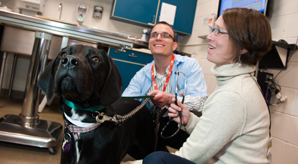

September 28 is World Rabies Day and veterinarians at Colorado State University are reminding their clients to be sure their pet’s rabies vaccine is up to date.
“One of the more frequent questions asked by our clients is whether their pet really needs a rabies vaccine,” said Dr. Rebecca Ruch-Gallie, Director of Community Practice and Shelter Medicine at the Veterinary Teaching Hospital. “The short answer: yes.”
Rabies is a virus that attacks the central nervous system of most mammals. The virus is usually transmitted by the bite of a rabid animal. The first signs of rabies can easily be confused for other illnesses and include fever and lethargy; but neurologic signs follow shortly and can range from paralysis to agitation. Excess salivation and difficulty swallowing are the classic signs of rabies infection. Death can occur within days after the first signs appear.
“Most counties across the continental United States require dogs and cats to have a current rabies vaccine,” said Dr. Ruch-Gallie. “Regardless of the legal reason, vaccination is still the best method we have for preventing this fatal disease."
According to the World Health Organization:
In the United States, aggressive vaccination against rabies in pets has shifted the main source of rabies from dogs to wildlife; primarily raccoons, skunks, bats, and foxes. Bat rabies is still the most commonly seen in Colorado but, since 2008, there has been a large increase in rabid skunks. The Colorado Department of Public Health reports that through August of this year, 64 animals tested positive for rabies. At least 14 humans and 49 domestic animals were exposed to these positive cases.
“So, yes,” said Dr. Ruch-Gallie. “Please keep your companion animals (dogs, cats and horses) vaccinated as recommended by your veterinarian. If you or your animal is bit, contact the appropriate family doctor or the local health department immediately.”
Critter Corner is being brought to you by the CSU Veterinary Teaching Hospital Community Practice clinicians and staff. World-class veterinary care in your neighborhood. http://csuvth.colostate.edu/